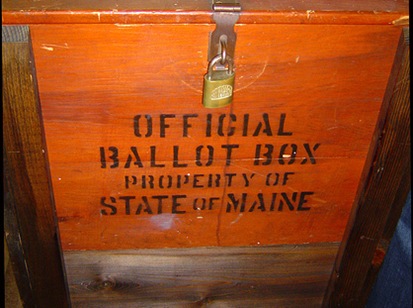campaign finance
 Nevada Governor Brian Sandoval has signed Assembly Bills 81 and 82, and Senate Bill 133 into law, making several important changes to the petition process both good and bad.
Nevada Governor Brian Sandoval has signed Assembly Bills 81 and 82, and Senate Bill 133 into law, making several important changes to the petition process both good and bad.
As the 26th Alaska Legislature wrapped up its 2010 session late Sunday night, making it harder for citizens to use the state’s already-restricted initiative process was at the front of lawmakers’ minds.
Two controversial anti-initiative bills are about to be brought up once again in the Maine Legal and Veterans Affairs Committee. Both bills would chill petitioning in Maine, and lawmakers have been hearing from activists on the issue. Fireworks are expected, and you can listen in right now live via the Legislature’s website by clicking here.

As I anticipated, yesterday’s work session in the Maine Legal and Veterans Affairs Committee discussion centered on Senator Seth Berry’s bill, the amended version of LD 1690 (LD 1690-A), that contains provisions meant to curtail the ballot initiative and People’s Veto referendum rights of Mainers. LD 1730, with similar provisions, was also slated to be discussed but was not.
“Spite, codified.” That was what Seattle Times columnist Bruce Ramsey recently called six bills in the Washington state legislature that aim to restrict the initiative process. All the bills would severely hamper Washingtonians’ Â constitutionally guaranteed right to put state laws on the ballot through petitioning. Ramsey says all the bills are sponsored by bitter legislators who want to take a slap at perennial initiative sponsor Tim Eyman.
The Alaska Public Offices Commission found Friday night that Governor Sarah Palin did not violate state election laws by announcing her position on a controversial ballot measure requiring tougher environmental standards for new mines.
A committee advocating a growth measure in Morgan Hill, CA could be fined up to $5,000 for failing to put their name on a mailer that they sent to 7,800 residents.
The 26th Alaska Legislature closed its session Sunday without passing House Bill 36. The bill would have required campaign finance reporting for initiative supporters and banned payment-per-signature.
Paying signature gatherers per-signature is the industry standard, even though critics claim that it invites fraud. Industry experts and ballot initiative rights supporters say that since initiative proponents only pay for valid signatures, it actually reduces fraud and increases productivity.
A federal district court ruled has ruled that Wisconsin’s campaign finance reporting requirements are overly restrictive on First Amendment rights in a case arising from a referendum campaign. According to Wisconsin’s election law, two Whitewater citizens who sought to distribute flyers and yard signsagainst a local referendum would have had to register with the state and comply with a host of other reporting regulations. The citizens brought suit and won, striking down the restrictions.